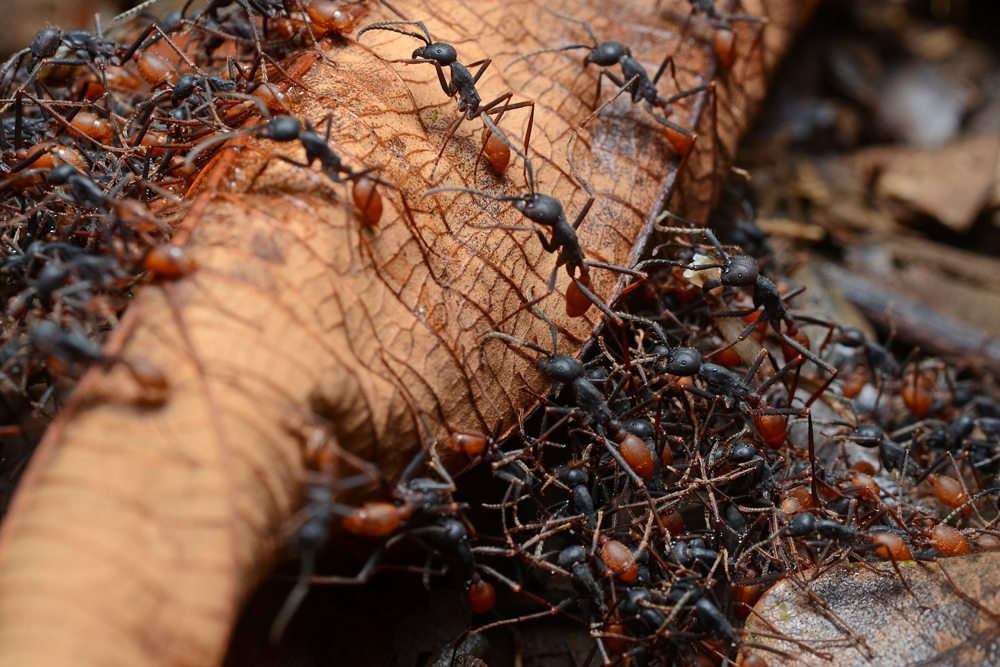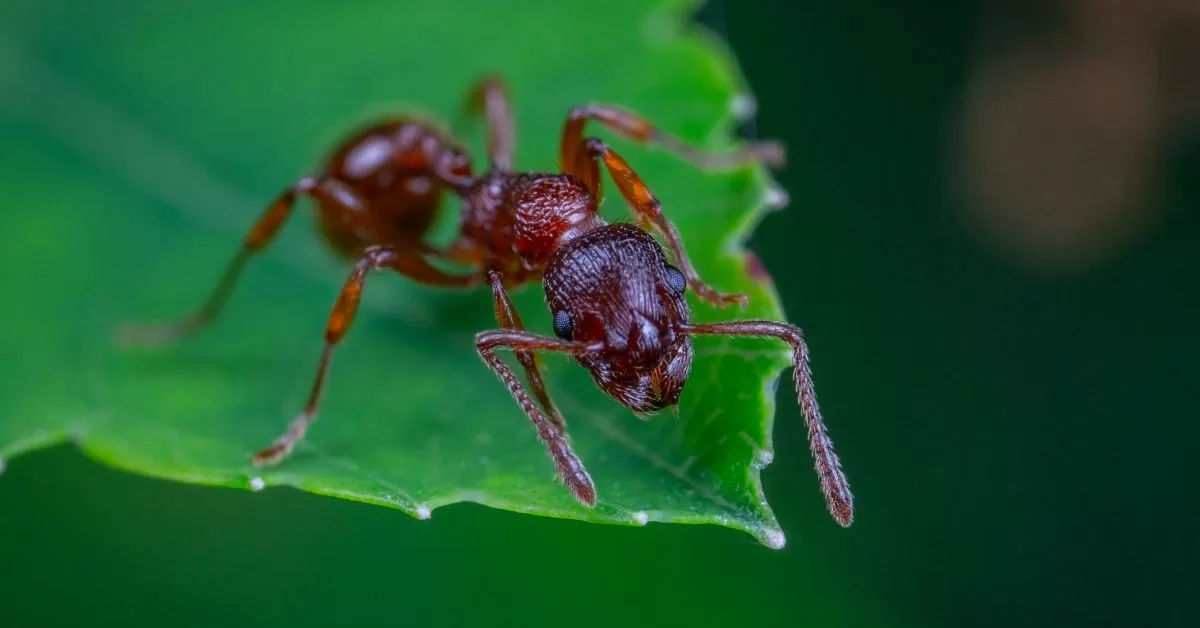An ant sting contains formic acid, also known as methanoic acid, which causes a burning sensation and irritation. But what happens if this simple burning sensation develops into a more severe allergic reaction?
Though ants are the smallest and hardest-working creatures, there are some ant species whose stings can be proven deadly in some individuals, leading to symptoms like difficulty breathing, swelling, and a drop in blood pressure.
For example, the bullet ant's sting is said to be one of the most painful insect stings in the world and can cause serious reactions in some individuals. Though deaths are relatively rare, anaphylaxis is the primary cause of fatalities resulting from ant stings.
In the United States, it is reported that more than 80 fatal anaphylactic reactions are associated with fire ant stings. Older surveys specifically noted 83 fatal and two near-fatal reactions from a study involving 29,300 physicians.
In this article, we'll take a look at the most dangerous ants in the world and explore the potential risks associated with their stings.
Check Out| Which Country Has the Most Languages in the World? List of Top 5 Countries with the Most Languages
List of the Most Dangerous Ants in the World
According to the latest data available, here are the top 7 ants with the deadliest venom in their stings:
| Ant Species | Primary Region(s) | Key Characteristics & Sting Impact |
| Bullet Ant | South America | Renowned for having the most painful insect sting, with intense pain that can persist for up to 24 hours. |
| Bulldog Ant | Australia | Highly aggressive with a potent sting. Known to have caused human fatalities. |
| Fire Ants | Southern US, Warm Climates | Aggressive stingers that cause significant pain. Their stings can trigger allergic reactions, including potentially life-threatening anaphylaxis. |
| Army Ants | Africa | Form massive swarms capable of overwhelming both animals and humans. While their bites are painful, their primary threat comes from their sheer numbers. |
| Maricopa Harvester Ant | Southwestern US | Possesses the most toxic venom among all ant species. Its sting, while very painful to humans, can be lethal to smaller animals. |
| Florida Harvester Ant | Florida | Their sting is characterised by intense pain and significant swelling. |
| Green Tree Ants | Australia, Southeast Asia | Known for their aggressive defence of their nests. While their sting is not typically highlighted as fatal, their defensive behaviour can lead to multiple painful stings. |
1. Bullet Ant

Source: Animals | HowStuffWorks
The Bullet Ant, found in the humid rainforests of Central and South America, earns its reputation as one of the most dangerous ants primarily due to its unrivalled sting pain, famously ranked as a "4+" on the Schmidt Sting Pain Index.
Its venom, a potent neurotoxin called poneratoxin, causes excruciating, throbbing, and burning pain that can last for up to 24 hours, often compared to being shot – hence its name.
These large ants, typically black or reddish-black and around 18-30 mm long, hunt smaller insects and arthropods, but their true danger lies in their defensive sting when their nest is disturbed.
2. Bulldog Ant

Source: Ants HQ
The Bulldog ant, a resident of the coastal regions of Australia, is a formidable predator and is considered one of the world's most dangerous ants because of its aggressive nature and potent poison.
These large ants, which vary in colour from red to black and reach up to 40 mm in length, have a powerful sting and strong mandibles.
Their venom contains histamine and cinnamyl alcohol, which can cause severe pain and swelling and, in sensitive individuals, rapid anaphylactic shock, leading to human death.
They are opportunistic predators, switching to a variety of insects and even small vertebrates, actively hunting instead of just feeding.
3. Fire Ants

Source: Professional Pest Manager
Fire ants, especially the imported red and black fire ant species, are considered dangerous because of their highly aggressive prickly behaviour and the ability of their venom to trigger serious allergic reactions.
Originally from South America but now widespread in the southern United States and other warm climates, these small, red-brown ants (2-6 mm) give a painful, burning sting. Venom contains piperidinal alkaloids, causing localised pustules and intense pain.
The primary danger lies in their tendency to swarm and deliver several stings, leading to a higher risk of anaphylaxis in receptive individuals and, in rare cases, death. They are omnivorous and live on seeds, insects and small vertebrates.
4. Army Ants

Source: Discover Magazine
Army ants, which are mainly found in Africa and parts of Asia and America, are considered dangerous, not for their venom toxicity for humans, but for their overwhelming number and coordinated predatory game heater.
While individual stings or bites are not particularly potent, their pure numerical strength lets them overwhelm and consume almost any creature in their path, including small animals and insects.
These ants are nomadic, with distinct soldiers with large heads and powerful mandibles, often reddish-brown to black, varying in size.
Their "danger" is more about being a natural force that can cause painful pieces and cause panic rather than a poison-induced mortality. They switch to a large selection of invertebrates and small vertebrates.
5. Maricopa Harvester Ant

Source: AntOnTop
Maricopa harvest ants, residents in the dry areas of the southwestern United States, are considered dangerous due to possessing the most toxic insect venom known, per volume.
Their venom, a complex cocktail of piperidinal calyces and proteins, delivers an intensely painful sting, often described as comparable to a scorpion sting.
While a single sting is hardly deadly to a healthy human, several stings can be extremely dangerous, especially for small animals, which are their primary prey (seeds, insects).
These large ants, typically reddish brown and about 5-7 mm long, are not aggressive unless their nest is disturbed, which primarily makes the danger of random encounters instead of active persecution.
Read On| Which Country Has the Most Official Languages in the World? Check Top 5 Countries
6. Florida Harvester Ant
The Florida Harvester Ant, common in the southeastern United States, is considered dangerous primarily because of the intense pain and significant swelling their sting causes.
Although it is not typically lethal to humans, their venom, which contains various proteins and peptides, can cause a throbbing, burning sensation that can last for several hours.
These ants, typically reddish-brown and around 5-10 mm in length, are often found in open, sandy areas where they construct large mounds.
They are primarily seed-eating but will also feed on insects. Their danger lies in their defensive, prickly behaviour when their nests are disturbed, leading to painful encounters for unsuspecting individuals.
7. Green Tree Ants
Green wooden ants, widespread in tropical regions in Australia and Southeast Asia, are considered dangerous because of their very aggressive defence of their nests and the painful bite and formic acid spray they inflict.
Although they do not have a strong venom like any other dangerous ants, their bite is supplied by powerful mandibles, immediately followed by a spray of formic acid in the wound, causing sharp, stinging pain and irritation.
These ants are pale green with red-brown heads and legs, about 5-7 mm long. They build elaborate nests by weaving leaves together, and their territorial nature means that they will strongly attack everything that is perceived as a threat. They are opportunistic predators which live on a wide range of insects.
Which is the Most Dangerous Ant in the World?
According to the Guinness World Records, the Bulldog Ant (Myrmecia pyriformis) is widely recognised as the most dangerous ant in the world.
Here's why:
- Human Fatalities: The Bulldog Ant has been directly responsible for documented human deaths due to anaphylactic shock from its venom. While other ants can cause severe allergic reactions, the Bulldog Ant has a more established record of fatalities.
- Extreme Aggression: Unlike some ants that only sting when provoked, Bulldog Ants are highly aggressive and will actively pursue perceived threats.
- Potent Sting and Jaws: They not only possess a powerful sting but also use their large, strong jaws simultaneously in an attack, delivering a significant amount of venom.
- Speed of Reaction: Their venom can cause rapid allergic reactions, potentially leading to death within 15 minutes in highly sensitive individuals.
What's Next| List of Top 10 Most Dangerous Bees in the World
